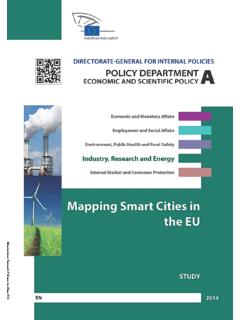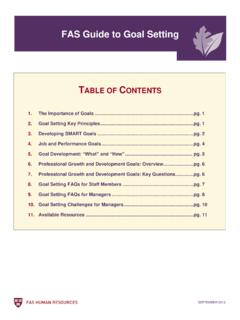Transcription of SMART CITY PROJECTS ASSESSMENT GUIDEBOOK …
1 SMART city PROJECTS ASSESSMENT GUIDEBOOK Deliverable 2 Bank Supervisor: project Leader: Authors: Contributors: Collaborators: Leonor Berriochoa (EIB ) An Mdres onz (Ton RANSyT-UPM)Guillermo Velazquez-Romera (TRANSyT-UPM) Victoria Fernandez-Anez (TRANSyT-UPM) Fiamma Perez-Prada (TRANSyT-UPM) Khalid Bougalim Ben-Hammou (TRANSyT-UPM) Mar a Ramirez Valad s (TRANSyT-UPM)Experts Nouha Ghosseini (Professor at Lebanese University) Rudolf Giffinger (Technical University of Vienna)Jose Miguel Fernandez-G ell (UPM) Mario Aymerich (EIB) Guy Fleuret (UfM) Paul Pfaffenbichler (Vienna University of Technology) Angela Poletti (Politecnico di Milano) Filippo Contenti (Malaga city ) Brini Abdellatif (Tanger city ) Ali Maqousi (University of Petra)
2 Lourdes Diaz (National School for Sustainable Land Use Planning) ASCIMER SMART city PROJECTS ASSESSMENT METHODOLOGY 1 CONTENT SUMMARY .. 5 .. 9 BACKGROUND .. 11 ASCIMER SMART city DEFINITION .. 11 SMART city project DEFINITION .. 12 ASCIMER SMART city DIMENSIONS .. 14 ASCIMER SMART project ACTIONS .. 16 METHODOLOGY FOR SMART city PROJECTS .. 17 CONTEXT AND OBJECT .. 21 SMART city project CRITERIA .. 24 QUALITY ASSESSMENT .. 25 SC [PAM]: SMART city PROJECTS ASSESSMENT Matrix .. 30 BANKABILITY .. 38 ASCIMER SMART city PROJECTS ASSESSMENT METHODOLOGY OVERVIEW .. 39 OF ASCIMER ASSESSMENT METHODOLOGY .. 41 CASE STUDY 1: ZENATA ECO- city ; CASABLANCA, MOROCCO.
3 42 CASE STUDY 2: MUNICIPAL GIS PLATFORM; RAMALLAH, PALESTINE .. 44 CASE STUDY 3: NEW SUSTAINABLE URBAN DEVELOPMENT; SFAX, TUNISIA .. 46 CASE STUDY 4: E-VEHICLE PILOT; AMMAN, JORDAN .. 48 RESEARCH .. 50 ASSESSMENT METHODOLOGY: USER MANUAL .. 51 USE OF THE TOOL .. 51 REFERENCES .. 58 ANNEX I: ASCIMER project ACTIONS .. 62 ANNEX II: ASCIMER SMART city SOUTH AND EAST MEDITERRANEAN CHALLENGES .. 68 2 ASCIMER SMART city PROJECTS ASSESSMENT METHODOLOGY ASCIMER SMART city PROJECTS ASSESSMENT METHODOLOGY 3 ASCIMER project ASCIMER (Assessing SMART city Initiatives for the Mediterranean Region) is a 3-year research project supported by the European Investment Bank under the EIB University Research Sponsorship Program (EIBURS).
4 The overall goal of this research project is to develop a comprehensive framework that allows public and private stakeholders to make informed decisions about SMART city investment strategies as well as to build skills to evaluate and prioritize these kind of PROJECTS , including recommendations addressed at reducing difficulties regarding deployment and transferability. The project has the following specific objectives: To define the SMART city concept and to understand how it can contribute to meet urban development priorities. To develop a methodology to assess and prioritize SMART city PROJECTS . To develop guidelines to implement and manage SMART city PROJECTS .
5 To Characterize Mediterranean city challenges and to develop a transferability strategy of SMART city PROJECTS . This objective will be part of the other three above. Figure 1. ASCIMER project structure overview. 4 ASCIMER SMART city PROJECTS ASSESSMENT METHODOLOGY ASCIMER SMART city PROJECTS ASSESSMENT METHODOLOGY 5 0. EXECUTIVE SUMMARY Nowadays, many initiatives aim to analyze the conception process, the deployment methods and/or the outcomes of the - referred as - SMART city PROJECTS , that are being developed in multiple cities and knowledge fields. However, there is a lack of standardized metrics and methodologies to assess, prioritize, finance, implement, manage and replicate this kind of PROJECTS across cities , and more importantly, across developing cities .
6 Thus, the ASSESSMENT of SMART cities through structured ad-hoc models appears as a key element in the development of SMART cities in the Mediterranean Region. To avoid inefficient resource allocation the tools applied should take into account the SMART characteristics of the project while also considering the actual needs of the city . Applying such tools should enhance the development of a SMART city Model for the Mediterranean Region. Finally, for the tools to be effective in characterizing and assessing the reality of SMART city PROJECTS in the Region, the involvement of the different stakeholders has been a key element. The definition of a SMART city is a very broad concept that has technology as a basic aspect, coupled with social and human capital development.
7 ASCIMER has developed its own working definition that serves as a basis to the development of the ASSESSMENT methodology. A SMART city project (SCP) is a project that generates a change and produces an impact towards the achievement of a SMART city . However, we have found that the SMART city should consider technology in a wider sense, and not only as ICTs ( new materials). SCPs should make cities more comfortable to live in while maintaining complexity, multiplying interactions, recognizing diversity and managing uncertainty. All of these factors are inherent characteristics of urban dynamics and hold the attractiveness of cities and their current intelligence.
8 The ASCIMER ASSESSMENT methodology aims to evaluate SMART city PROJECTS , understanding their impacts in the city and their contribution to reach a SMART city . Each of the following key elements should be inherently part of a SCP. Therefore, they constitute the basis for developing the ASCIMER methodology, as explained throughout this document: Five different ASSESSMENT steps compose the structure of the ASCIMER methodology, as shown on figure 3. Each of them in an ASSESSMENT block that apply a set of criteria, selected to comply with the global ASSESSMENT objectives. The order of the blocks has been set taking into account both the logic of the ASSESSMENT process and the usability for EIB evaluators.
9 ASCIMER s SMART city working definition A SMART city is an integrated system in which human and social capital interact, using technology-based solutions. It aims to efficiently achieve sustainable and resilient development and a high quality of life addressing urban challenges on the basis of a multistakeholder, municipality based partnership INNOVATION INTEGRATION INCLUSION Figure 2: SMART city PROJECTS characteristics 6 ASCIMER SMART city PROJECTS ASSESSMENT METHODOLOGY Figure 3: Steps of the ASSESSMENT Process (5 blocks) 1-CONTEXT AND OBJECT The purpose of this conceptual block is to bring together all the basic information related to the description of the project .
10 It includes apart from the characterization of the project itself, its setting characteristics, and the city context in terms of territorial background, infrastructures and institutions. It also contains a quick of the project and a first verification of its coherence among actions and goals. This information is also useful for further evaluation phases. Figure 4: SMART city project breakdown into project actions 2- SMART city project CRITERIA The second ASSESSMENT block deals with the smartness of the project actions. The main subsections to be assessed in this block are those defined as essential for SC PROJECTS in ASCIMER Deliverable 1: Innovation, Integration and Inclusion.











